(Esp/Eng) Efectos Secundarios (2025): Algunas preguntas sin respuestas fáciles./ Side Effects (2025): Some questions with no easy answers.
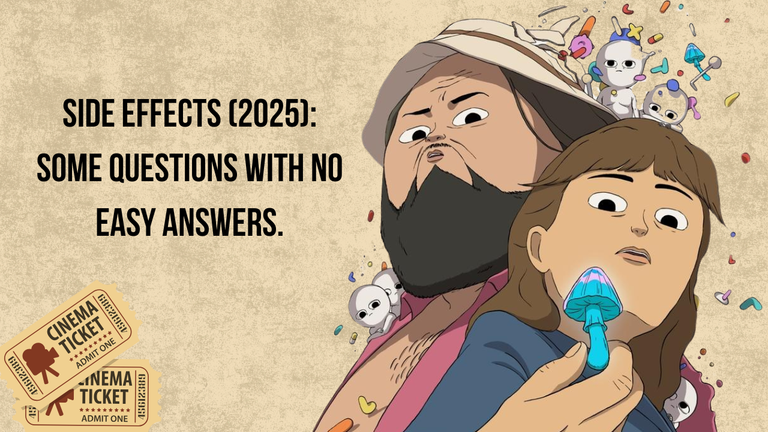
[Esp]
Hola, mis compañeros de butaca. Espero estén bien. Hoy quiero hablarles de una serie animada la cual lleva por nombre “Efectos Secundarios" creada y dirigida por Joseph Bennett y Steve Hely. Distribuida por Adult Swim, debuto el 2 de febrero 2025 en Max, consta de 10 capítulos en la primera temporada. Y, créanme cuando les digo que, no es la típica caricatura para pasar el rato. Aparte de ser entretenida, plantea cuestiones que te hacen pensar, y mucho, después de que termina cada episodio. Es ese tipo de historia que te revuelve un poquito la cabeza.
La animación, nos presenta unos personajes de cabezas grandes y un aspecto bastante peculiar, pero esto no le quita merito al nivel de detalle en los movimientos y el lenguaje corporal, que creo está muy bien logrado. Ya que todos los personajes consiguen transmitir de una manera magistral, que lo absurdo se sienta real y lo real, absurdamente caótico. Y eso, para mí, ya es un plus.
! [English version]
Hello, my seatmates. I hope you are well. Today I want to tell you about an animated series called “Side Effects” created and directed by Joseph Bennett and Steve Hely. Distributed by Adult Swim, it debuted on February 2, 2025 on Max, it consists of 10 episodes in the first season. And, believe me when I tell you, it's not your typical cartoon to pass the time. Aside from being entertaining, it raises questions that make you think, and think a lot, after each episode ends. It's that kind of story that turns your head a little bit.
The animation presents us with characters with large heads and a rather peculiar appearance, but this does not detract from the level of detail in the movements and body language, which I think is very well done. Since all the characters manage to transmit in a masterful way, that the absurd feels real and the real, absurdly chaotic. And that, for me, is already a plus.

[Esp]
Solo imagínense esto: en lo profundo de Perú, alguien descubre un hongo mágico, el "Ángel Azul". Pero no, este no es cualquier hongo. Este hongo tiene el poder de curar absolutamente todo, desde un rasguño hasta la enfermedad más mortal. ¿Se lo pueden imaginar? Adiós gripes, adiós heridas, adiós enfermedades terminales, ósea todo.
Pues esta serie nos plantea tal situación en nuestro presente, con un micólogo algo peculiar, que encuentra ese hongo capaz de curar cualquier enfermedad. Lo interesante de este planteamiento es cómo la serie utiliza esta premisa para construir un sarcasmo mordaz sobre la industria farmacéutica. Jugando con elementos que todos manejamos y conocemos de nuestro día a día. Los que vivimos la pandemia recordamos muy bien cómo se movían los hilos entre las farmacéuticas y los gobiernos. Bueno, pues la serie toma esa realidad y la lleva un poco más allá.
! [English version]
Just imagine this: deep in Peru, someone discovers a magic mushroom, the “Blue Angel”. But no, this is not just any mushroom. This fungus has the power to cure absolutely everything, from a scratch to the most deadly disease. Can you imagine? Goodbye flus, goodbye wounds, goodbye terminal diseases, goodbye everything.
Well, this series presents us with such a situation in our present, with a somewhat peculiar mycologist, who finds a fungus capable of curing any disease. The interesting thing about this approach is how the series uses this premise to build a biting sarcasm about the pharmaceutical industry. Playing with elements that we all handle and know from our daily lives. Those of us who lived through the pandemic remember very well how the strings were pulled between pharmaceutical companies and governments. Well, the series takes that reality and takes it a little further.
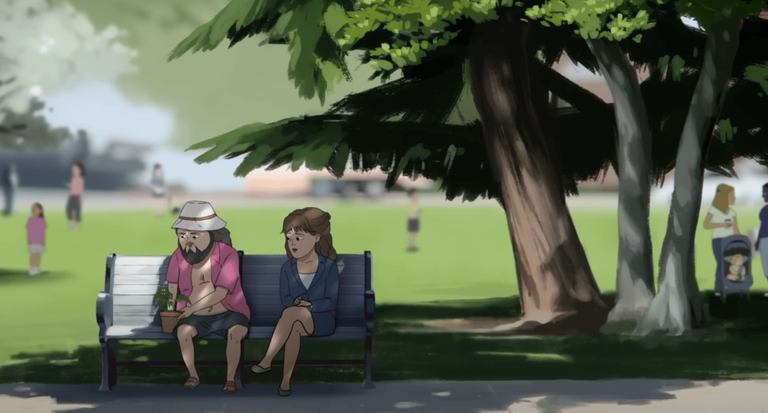
[Esp]
Les comparto la sinopsis oficial. La serie arranca con Marshall y Frances, dos excompañeros de preparatoria, reconectando después de años. Lo que parece una historia de reencuentro científico se convierte rápidamente en la revelación de una conspiración de proporciones épicas, en la que están implicadas las grandes farmacéuticas y el gobierno para extraer un hongo que podría contener la solución para curar todas las enfermedades del mundo.
! [English version]
Here is the official synopsis. The series kicks off with Marshall and Frances, two former high school classmates, reconnecting after years. What seems like a scientific reunion story quickly turns into the revelation of a conspiracy of epic proportions, involving big pharma and the government to extract a fungus that could contain the solution to cure all the world's diseases.
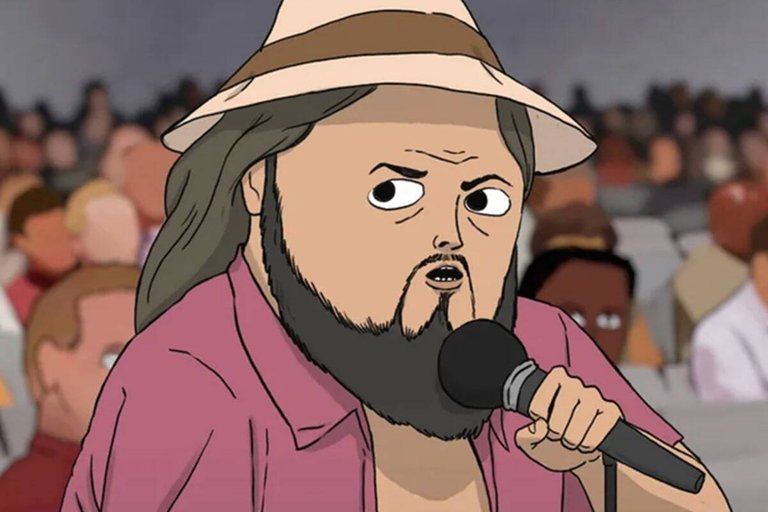
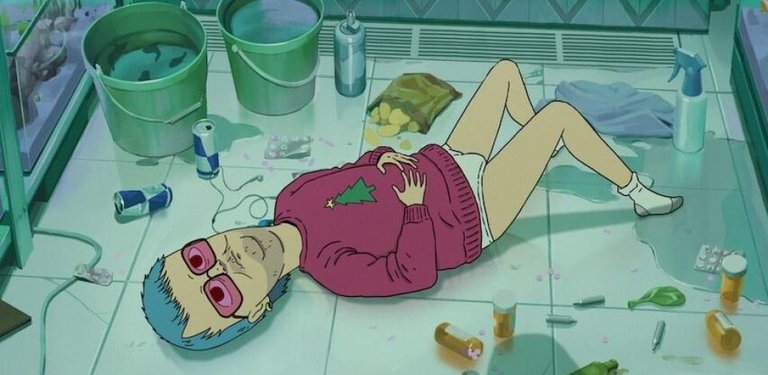
[Esp]
Lo primero que me atrapó de Efectos Secundarios fue ese punto de partida: un hongo que cura todo. Díganme quién no ha soñado con algo así. Es ese tipo de serie que no solo te plantea un dilema fascinante sobre el impacto de una cura milagrosa, sino que también te obliga a cuestionar qué significa "hacer el bien".
Marshall el micólogo que descubre el hongo, quiere que la cura llegue a todos, pero pronto enfrenta una realidad más compleja. Él es un idealista, con su camisa siempre abierta y sus conexiones dudosas. No es el típico genio excéntrico de las series. Él quiere hacer el bien, pero no siempre sabe cómo, o no tiene el valor de romper con lo establecido.
Luego está Frances, que trabaja en Rutica una farmacéutica gigante. Ella cree que, por más que le duela, solo una empresa así puede distribuir la cura a todo el mundo. Ella entiende y maneja que el mundo real tiene sus complejidades y sus presiones. Lo que la lleva a tener conflictos internos.
! [English version]
TThe first thing that grabbed me about Side Effects was that starting point: a fungus that cures everything. Tell me who hasn't dreamed of something like that. It's that kind of series that not only sets you up with a fascinating dilemma about the impact of a miracle cure, but also forces you to question what it means to “do good.”
Marshall, the mycologist who discovers the fungus, wants the cure to reach everyone, but soon faces a more complex reality. He is an idealist, with his shirt always open and his connections dubious. He is not the typical eccentric genius of the series. He wants to do good, but doesn't always know how, or doesn't have the courage to break with the established.
Then there is Frances, who works at Rutica, a giant pharmaceutical company. She believes that, as much as it pains her, only such a company can distribute the cure to the whole world. She understands and manages that the real world has its complexities and pressures. Which leads her to have internal conflicts.

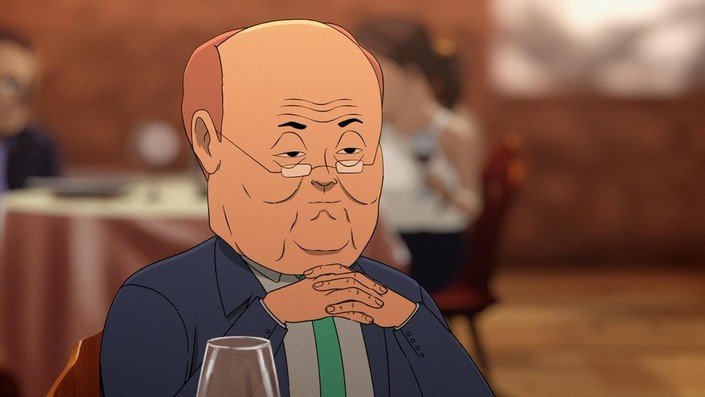
[Esp]
En Efectos Secundarios no se van a encontrarte con los típicos supervillanos, sino con gente muy normal, y algunos de ellos con demasiado, pero demasiado poder, ¡y eso mis amigos, sí que da miedo!
Todos los personajes tienen sus motivaciones, sus luces, sus sombras y por supuesto postura diferente, pero hay dos que destacan. Uno de ellos es Rick Kruger, el director ejecutivo de Rutica. Este personaje es la viva imagen de la apatía. No le importa un comino lo que el hongo pueda hacer o deshacer, solo le preocupa su bolsillo y no perder su vida de lujos. Y el otro es Jonas Backstein, él es cerebro detrás de todo en la industria farmacéutica. Su visión, aunque suene fría, te hace cuestionar si la humanidad está realmente preparada para un poder tan absoluto. Él ve el panorama completo y dice: Cuidado. Si curamos a todos, el mundo se va a pique. Su argumento consiste en que, si el hongo cura todo, miles de empleos desaparecerían. Toda la economía del medicamento se derrumbaría. Para él, la imperfección y la ambigüedad son necesarias para que la humanidad funcione. Suena algo cínico, ¿cierto? Pero me dejo preguntándome y si tiene algo de razón.
! [English version]
In Side Effects you are not going to meet the typical supervillains, but very normal people, and some of them with too much, but too much power, and that my friends, is really scary!
All the characters have their motivations, their lights, their shadows and of course different posture, but there are two that stand out. One of them is Rick Kruger, the CEO of Rutica. This character is the spitting image of apathy. He doesn't give a damn about what the fungus can do or undo, he only cares about his pocket and not losing his life of luxury. And the other is Jonas Backstein, he is the mastermind behind everything in the pharmaceutical industry. His vision, although it sounds cold, makes you question whether humanity is really ready for such absolute power. He sees the big picture and says: Beware. If we cure everyone, the world is going to go down the drain. His argument is that, if the fungus cures everything, thousands of jobs would disappear. The whole drug economy would collapse. For him, imperfection and ambiguity are necessary for humanity to function. Sounds a bit cynical, doesn't it? But I'm left wondering if he has a point.
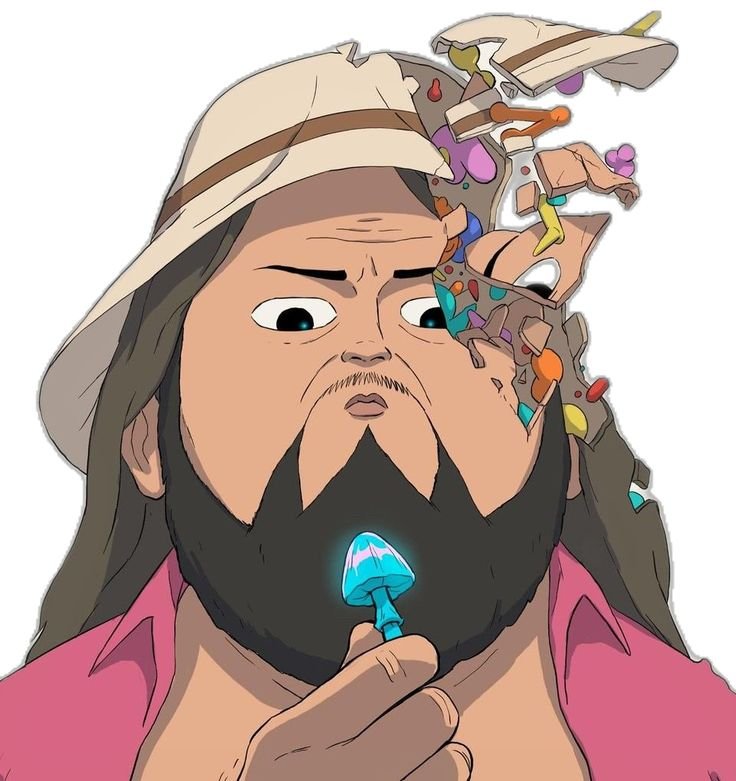
[Esp]
Pero lo que más valoro de Efectos Secundario, es que te trata como alguien que puede pensar. No te da las respuestas en bandeja de plata. Te presenta un verdadero dilema, te muestra las distintas caras de la moneda y te deja a ti con la tarea de reflexionar. Te hace pensar en el poder, en la ética, en nuestra propia naturaleza humana. ¿Estamos preparados para un mundo sin enfermedades? ¿Se derrumbarían industrias enteras? ¿Empoderaría esto a personas peligrosas? ¿Cómo cambiaría la economía, la sociedad y la ética humana, si nadie enfermara?
En Efectos Secundario logran hacer que los anteriores dilemas filosófico se sientan cercanos, entretenidos y con ese ritmo que te atrapa. Te enfrenta a esos dilemas que no puedes responder con simpleza, te hace cuestionar tus creencias sobre la salud y el poder, y te obliga a admitir que incluso las mejores intenciones pueden tener consecuencias imprevistas. La serie no te obliga a dar una conclusión a la historia, sino que te deja una pregunta abierta.: si tuvieras el poder de curar al mundo entero, ¿lo harías sin importar las consecuencias?
Súper recomendada, de verdad. Cuéntenme si la ven, qué les parece.
Gracias por leerme. Saludos.
! [English version]
But what I value most about Side Effects, though, is that it treats you as someone who can think. It doesn't give you the answers on a silver platter. It presents you with a real dilemma, it shows you the different sides of the coin and leaves you with the task of reflection. It makes you think about power, about ethics, about our own human nature. Are we prepared for a world without disease? Would whole industries collapse? Would this empower dangerous people? How would the economy, society and human ethics change if no one got sick?
In Side Effects they manage to make the above philosophical dilemmas feel relatable, entertaining and with that rhythm that grabs you. It confronts you with those dilemmas you can't answer simply, makes you question your beliefs about health and power, and forces you to admit that even the best intentions can have unintended consequences. The series doesn't force you to give a conclusion to the story, but leaves you with an open question: if you had the power to heal the whole world, would you do it no matter what the consequences?
Highly recommended, really. Let me know if you see it, what you think.
Thank you for reading me. Regards.